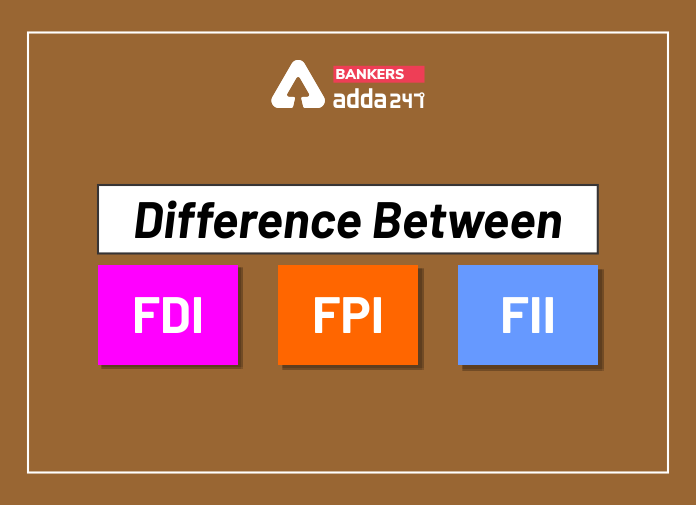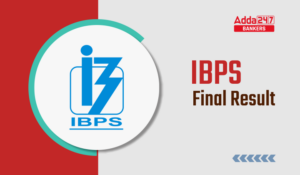Table of Contents
Difference between FDI, FII & FPI: Capital is very important for the economic development of a nation and most of the time the capital requirement is fulfilled through external sources known as foreign investment. The investment by the foreigners usually takes place in the following ways known as :Foreign Direct Investment (FDI) and Foreign Portfolio Investment (FPI) / Foreign Institutional investor (FII). Students usually get confused among these terminologies so in this article we will make sure that you get the difference between these frequently used terms.
Practice With,
What Is Foreign Investments?
Any investment that flows to one country from any other country is known as foreign investment. This capital raise from foreign counterparts complements and leads to domestic investments in capital-scarce economies. In India, Foreign investment can only be allowed to take the form of investments ( through Capital market) in listed companies referred to as FII/FPI Investment and any capital raise from other than these investments is termed as FDI.
Also Read,
| What is Repo Rate ? | What is PMJDY? | CLR Vs SLR | Coronavirus Count |
About FDI (Foreign Direct Investment)
FDI refers to an investment made by a foreign company in already existing company of other nations or by setting up a subsidiary. For ex- If the USA invests either in Reliance jio or by setting up a subsidiary of a USA based company in India. In both the ways India is getting foreign direct investment.
In case of FDI, the motive of an investor is to gain effective power in an enterprise or significant degree of influence and control over the company. The Investment by the foreign company/group/person is termed as a direct investor and the enterprise where the investment is done is known as direct investment enterprise.
A threshold of 10 percent of equity ownership is required to qualify an investor as a “foreign direct investor”.
NEED of FDI
- FDI helps to meet the capital need of a country and also serves as an important source to fulfill the gap between income and savings.
- It also results in technology up-gradation and efficient exploitation of natural resources along with the development of basic infrastructure.
- It is also responsible for the balance of payment conditions and helps the recipient firms to cope with competition in better ways.
- FDI is a great source of better technology and management, marketing networks and offers competition.
The Factors Which Help In Better Inflow Of FDI Are:
- If the recipient country has stable policies in favor of foreign investment.
- If it offers favorable economic factors like interest loan subsidies.
- Recipient countries must have the removal of restrictions.
- Foreign Investors must be given tax exemptions.
- There should be the availability of cheap and skilled labor.
Foreign Portfolio Investment
Foreign Portfolio investment is the passive holdings of securities such as foreign stocks, bonds, or other financial assets, none of the stated areas require active management or control of the securities‘ issuer by the investor. In other words, FDI and FPI are similar except the fact that foreign investors have no role to play in active management and day to day business.
Some Examples Of Portfolio Investment Are:
- Investment in the shares of a foreign company.
- Investment by Purchasing the bonds issued by a foreign government.
- Acquisition of assets in a foreign country.
Factors Affecting International Portfolio Investment:
- The percentage of tax on interest or dividends. Lower the tax higher the investment.
- The interest rate offer by the recipient country must be high on Investment.
Foreign Institutional Investor (FII)
FII refers to the group of investors who helps to bring the FPI in a country. It helps the recipient country companies to improve performance. The way through which foreign portfolio investment is to allow into the Indian stock market is foreign institutional investors.
Any of the given below entities can be considered as Foreign Institutional Investors.
- Pension Funds
- Mutual Funds
- Investment Trust
- Insurance or reinsurance companies
- Endowment Funds
- Trustees
- Bank
What Is The NEED of FII?
- India adopts two mechanisms to increase the inflow of foreign capital into the country. one is through FDI and second is by encouraging the portfolio capital inflow which provides financing means to Indian enterprises.
- FII plays an important role to create non-debt creating foreign capital inflows and it also develops the Capital market in India, lower the cost of capital for Indian enterprises and indirectly improve corporate governance structures.
- FII helps in the building of currency reserves of India, The Major source of their investment is in the form of participatory notes (P notes) also commonly known as offshore derivatives.
| FDI | FDI refers to an investment made by a foreign company by acquiring a certain share in the already existing company of other nations or by setting up a subsidiary. |
|
Ex-If the USA invests either in Reliance jio or by setting up a subsidiary of a USA based company in India. In both the ways India is getting foreign direct investment. |
| FPI | FPI refers to investment such that foreign investors have no role to play in active management and day to day business. | It helps to bring investment into the recipient country. | Ex-
|
| FII | FII refers to the group of investors who helps to bring the FPI in a country. |
|
|
Click Here to Register for Bank Exams 2020 Preparation Material
Practice With,
Frequently Asked Questions:
Q. What is FDI?
Ans. FDI refers to an investment made by a foreign company by acquiring a certain share in the already existing company of other nations or by setting up a subsidiary.
Q. What is FPI?
Ans. FPI refers to investment such that foreign investors have no role to play in active management and day to day business.
Q. What is FII?
Ans. FII refers to the group of investors who helps to bring the FPI in a country.
Q. What is the major difference between FDI and FII?
Ans.FDI and FPI are similar except the fact that foreign investors have no role to play in active management and day to day business.



 IBPS Final Result 2025 Coming Out Tomorr...
IBPS Final Result 2025 Coming Out Tomorr...
 Simple Tips to Avoid Common Mistakes In ...
Simple Tips to Avoid Common Mistakes In ...
 Important Topics & Shortcuts for IDB...
Important Topics & Shortcuts for IDB...


